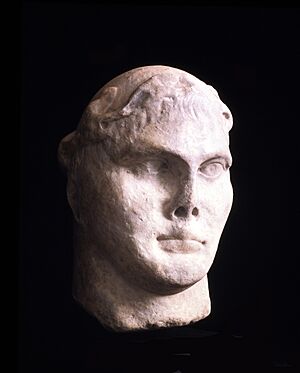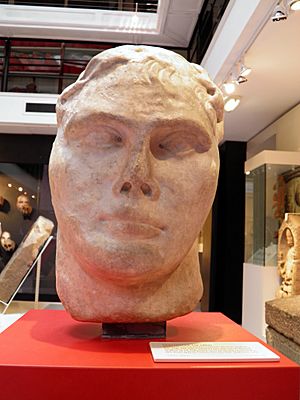Head of Constantine the Great, York facts for kids
Quick facts for kids Head of Constantine the Great, York |
|
|---|---|

Constantine the Great
|
|
| Material | Marble |
| Created | Original c.2nd century, remodelled in c.AD 306 |
| Period/culture | Roman |
| Discovered | before 1823 Stonegate, York, North Yorkshire |
| Present location | Roman Gallery, Yorkshire Museum, York |
| Identification | YORYM: 1998.23 |
The Head of Constantine the Great, York is a famous marble sculpture. It's the only part left of a much bigger statue of the Roman Emperor Constantine the Great. This ancient head was discovered in Stonegate, York, before the year 1823. Today, you can see it at the Yorkshire Museum.
Contents
How the Head Was Found
Unearthing an Ancient Treasure
The Head of Constantine was given to the Yorkshire Philosophical Society's museum in 1823. This museum later became the Yorkshire Museum. A surgeon named James Atkinson donated it. He had found the head during digging work for a drain in Stonegate.
Stonegate is an old street in York. It sits on top of where a Roman road once was. This road was part of the Roman fortress called Eboracum. It's possible the full statue stood in this very area long ago.
What the Head Looks Like
Details of the Sculpture
The head is a piece of a much larger statue. The original statue was twice the size of a real person. The head itself is about 42 centimeters (16.5 inches) tall. It is 27 centimeters (10.6 inches) wide and 30 centimeters (11.8 inches) deep.
Constantine's face is smooth and clean-shaven. He wears a corona civica, which was a special Roman award. The way the neck is shaped suggests the head was once turned slightly. It probably looked down and to the left, as if speaking to people below.
The Material Used
At first, people thought the head was made from a stone called Magnesian Limestone. But later, experts looked at it again. They found it was actually made of a rough, crystal-like marble. This marble might have come from Italy.
Why This Head Is Important
A Clue to Roman History
In 2018, a new study suggested something interesting. It said the bust was changed from an older statue. This older statue was likely of a different emperor, probably Hadrian. The study looked closely at the image, especially the corona civica.
Constantine received this special crown only after a big civil war in Italy. This war was against a rival named Maxentius. The study argues that the head was re-carved after AD 312. This is different from the old belief that it was made when Constantine became emperor in York in AD 306.
Where You Can See It
On Display at the Museum
The Head of Constantine has been on display at the Yorkshire Museum since it opened in 1830. It's a very popular exhibit.
Special Exhibitions
In 2006, the head was the main piece in an exhibition. It was called Constantine the Great: York's Roman Emperor. This show was called "the most important archaeological-historical loan exhibition" ever held in a museum outside London. The curator, Elizabeth Hartley, was key to making it happen. Over 58,000 people came to see it!
In 2010, the Yorkshire Museum closed for a year to get a new look. When it reopened, the head was still a central part of the new display. This new exhibition was called "Roman York - Meet the People of the Empire".
In 2013, the head traveled to Italy. It was loaned for exhibitions in Milan and at the Colosseum. This was to celebrate 1700 years since the Edict of Milan. The head returned to York in September of that year.
From July to October 2016, the bust was part of another exhibition. This one was about Constantine's father, Constantius I. The show was called "Constantius: York's Forgotten Emperor". It also featured a collection of ancient coins called the Wold Newton Hoard.


